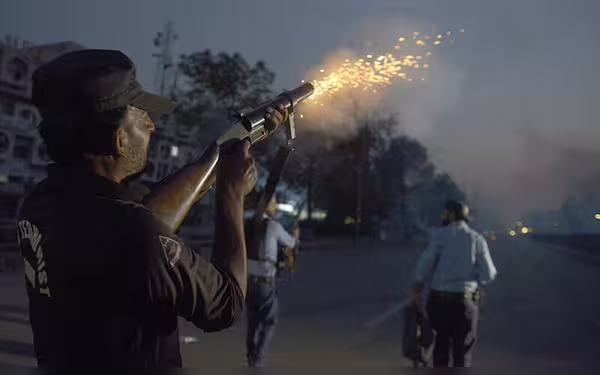Thursday, November 7, 2024 10:06 AM
PTI Protests Escalate in Islamabad as Army Deployed for SCO Summit Security
- Clashes between police and PTI supporters in Islamabad.
- Army deployed for security ahead of SCO summit.
- Imran Khan calls for peaceful protests amid unrest.
 Image Credits: dawn
Image Credits: dawnClashes erupt in Islamabad as PTI protests against Imran Khan's imprisonment, with the army deployed for security ahead of the SCO summit.
In a significant turn of events, clashes erupted between the police and supporters of the Pakistan Tehreek-e-Insaf (PTI) party in Islamabad on Friday night. This unrest coincided with the deployment of the Pakistan Army in the federal capital, tasked with ensuring security ahead of the upcoming Shanghai Cooperation Organisation (SCO) summit. The situation escalated as police attempted to disperse PTI protesters who were trying to reach D-Chowk for a planned rally, resulting in the arrest of at least 30 individuals.
Imran Khan, the incarcerated founder of PTI, has been vocal in calling for his supporters to engage in a "peaceful protest." Despite a ban on gatherings, the party has ramped up its preparations for demonstrations, with another rally scheduled for Lahore’s Minar-i-Pakistan on Saturday. The PTI has been actively protesting against what it describes as the "illegal" imprisonment of Khan and the delays by the Election Commission of Pakistan in implementing a verdict regarding reserved seats. The party's rallies are also aimed at advocating for the preservation of the Constitution.
In the lead-up to these protests, the government issued strict guidelines, which the PTI did not fully adhere to, leading to confrontations between party workers and law enforcement. The police responded to the escalating tensions by blocking all entry points to Islamabad and deploying tear gas to disperse the crowds. This action was taken despite warnings from Interior Minister Mohsin Naqvi, who had advised against holding rallies in the capital due to the presence of foreign dignitaries.
Interestingly, Maulana Fazlur Rehman of the Jamiat Ulema-i-Islam-Fazl, who has maintained a cordial relationship with the PTI, also urged the party to postpone its gatherings until the foreign visitors had departed. This highlights the complex political landscape in Pakistan, where alliances and strategies can shift rapidly.
The ongoing protests reflect a broader discontent among PTI supporters regarding the political climate in the country. As tensions rise, it remains to be seen how the government will respond and whether the PTI will continue to mobilize its base in the face of increasing opposition. The situation serves as a reminder of the delicate balance between political expression and public order, a challenge that many democracies face.













